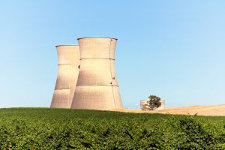Death, taxes, and....
A random observation. They say only 2 things are sure in life, death and taxes.
I’ve got a third: “If you lose a card, the number you need to call to get a new one will be the number on the back of the card… that you no longer have.”
Discussion
A Biblical Perspective on Environmentalism: What World Food Shortage? (2)
 Reprinted with permission from As I See It, which is available free by writing to the editor at [email protected]. Read the series so far.
Reprinted with permission from As I See It, which is available free by writing to the editor at [email protected]. Read the series so far.
There is at present more than enough food production worldwide to provide complete nutrition for everyone, and yet in the midst of this there is much malnutrition, as well as spotty local famine. How can this be? Simply stated, in nearly all such cases, the former is the result of poor human dietary (and economic) choices, and the latter is the consequence of deliberate malevolent governmental policies, as I will now explain.
Malnutrition is nearly universally the result of poor human choices. As every doctor could testify, the alcoholic who buys wine instead of food will soon be seriously deficient in numerous vitamins and minerals, to say nothing of protein. Then there are those who characteristically consume large amounts of white flour, white sugar, high fructose corn syrup, highly-processed foods with minimal vitamins or fiber, foods with artificially-created trans-fats, plus assorted artificial flavorings, colorings, and preservatives. In turn, they eat low amounts of whole grains, vegetables and fruit. By these choices, they are depriving themselves of a whole spectrum of nutrients, and increase their risk of various cancers, diabetes, digestive tract problems, as well as obesity and all the health problems that causes. Of course the consumption of soft-drinks in anything beyond moderation is a major contributor to malnutrition—lots of calories but zero nutrition. It is almost literally true that America’s malnutrition problem would be solved if we simply substituted milk for pop in our diet.
Discussion
A Biblical Perspective on Environmentalism: What World Food Shortage? (1)
 Reprinted with permission from As I See It, which is available free by writing to the editor at [email protected]. Read the series so far.
Reprinted with permission from As I See It, which is available free by writing to the editor at [email protected]. Read the series so far.
With the human species now numbering more than seven billion souls—and growing—we periodically hear claims that we are about to exhaust the earth’s food-producing resources and are on the precipice of widespread famine. Of course, we have been hearing such assured claims from professional alarmists for two centuries (at least since Thomas Malthus [1766-1834]), all backed up with “science” and facts and figures, and yet somehow the apocalyptic predictions have always failed of fulfillment. No, we humans aren’t even close to a food shortage and are currently producing nowhere near the earth’s maximum sustainable quantity of food. In truth, the primary factor limiting present production is insufficient demand.
On what basis do I assert that there is no world food shortage?
First, the two most populous nations, China and India, are food self-sufficient, that is, they currently grow enough food within their borders to feed all their billion-plus souls, and this in spite of the fact that in India, the dominant Hindu religion’s belief in reincarnation leads to the diversion of large quantities of grain to feed rodents and pigeons and other animals which will never end up as part of the human food supply (cattle in India at least provide milk products). In the case of China, they produce enough food to actually export some to other countries (just check a can of smoked oysters next time you shop for groceries, or a bag of pine-nuts, or dozens of other items—“product of China”—which, by the way, I refuse to buy due to grossly inadequate quality control practices there).
Discussion
The Personal Testimony of Charles T. Studd
[node:22019 collapsed body]

CHAPTER VII THE PERSONAL TESTIMONY OF CHARLES T. STUDD
Discussion
A Biblical Perspective on Environmentalism: Demand for Draconian Measures
 Reprinted with permission from As I See It, which is available free by writing to the editor at [email protected]. Read the series so far.
Reprinted with permission from As I See It, which is available free by writing to the editor at [email protected]. Read the series so far.
One of the favorite tactics of environmental extremists and their invariably uninformed “celebrity” spokespersons is to claim with panicked voice that we are on the brink, the very precipice of irremediable environmental and ecological disaster, and that mankind’s very existence and continuation as a species, along with life itself on earth hangs in utterly precarious balance, frighteningly close to the tipping point of no return. And, as a consequence, immediate and sweeping government-mandated and rigidly enforced changes in everything from toilet tank water capacity to grossly cost-ineffective and unworkable “alternate energy” sources to automobile mileage standards to the closing of coal and nuclear power plants are proposed and imposed on the populace, “for their own good,” regardless of how disruptive, expensive, inconvenient, even dangerous and unnecessary the forced changes may be—and inevitably are. “Never waste a crisis”—even if it is a manufactured, fictitious crisis—is the watchword of those who wish to seize power and dominate and domineer their perceived “inferiors” in the populace.
Among the most absurd of the draconian measures proposed, and not far from being imposed, is a so-called “carbon tax” to restrict, even punish those who add carbon dioxide to the atmosphere through the combustion—burning—of such non-renewable fuels as coal, oil and natural gas. That carbon dioxide—a minuscule .03% of the atmosphere—is a “greenhouse gas” is true; that that is a bad thing, is false. Without carbon dioxide in the atmosphere, along with the other, much more influential greenhouse gases (water vapor by far number one among them), the earth would trap less heat during the day and lose much more during the night. These gases which trap solar heat moderate the daily temperature swings on planet earth and make life possible. Without them, day time highs would regularly and substantially exceed 100 F. and at night the temperature would plunge below freezing, making agriculture—and human existence—impossible.
Discussion
A Biblical Perspective on Environmentalism: "Preservation" of Species by Human Economic "Exploitation"
 Reprinted with permission from As I See It, which is available free by writing to the editor at [email protected]. Read the series so far.
Reprinted with permission from As I See It, which is available free by writing to the editor at [email protected]. Read the series so far.
Though it may seem counter-intuitive to those who haven’t thought it through, in truth the best way to preserve an endangered (real or perceived) species is to insure that it is in the direct economic interest of people to preserve and propagate it. And this requires establishing, protecting and maintaining a market for the species and its products. If there is an economic incentive for preserving and propagating a species, it will be safe forever.
Case in point: the North American bison/buffalo (Latin, Bison bison). Originally numbering—what? 30? 60? 90 million? individuals (nobody really knows for sure), but reduced by wanton and wasteful slaughter to under 1,000 animals (some accounts say as few as 88) by the late 1880s, they have increased to nearly half a million today, a number that is growing rapidly. How is this possible? By giving bison owners the opportunity to make money from them. It is and has always been entirely legal to sell bison—their meat, hides, heads, and horns, and to hunt privately-owned herds, and as a consequence, those who have owned bison have had every incentive to protect, preserve and propagate their herds so as to have a never-ending supply of this commodity to sell. However, had some “genius” environmental extremist in the 1880s insisted on an “endangered species” classification for the bison, and imposed draconian penalties on those who bought or sold their products, the present population would be at best a few thousand—those in zoos or in national parks such as Yellowstone, where they would be a continuing economic burden rather than a profitable economic resource.
Discussion
A Biblical Perspective on Environmentalism: The Extinction of Species
 Reprinted with permission from As I See It, which is available free by writing to the editor at [email protected]. Read the series so far.
Reprinted with permission from As I See It, which is available free by writing to the editor at [email protected]. Read the series so far.
All species, or “kinds” (to use the term employed in the English Bible), of animals and plants are God’s deliberate creations, and as a consequence had in the past and do have in the present their niche in the complex “natural world,” though their originally harmonious contribution may have subsequently become decidedly warped and distorted by the fall of man. Even the most unremarkable species may be of particular value to mankind (though direct usefulness to man is not the ultimate standard of value). I think of the armadillo. This species is of no apparent direct economic value to man (though some folks in Texas are reported to hunt and eat them) and in fact is often a nuisance as it digs burrows in pastures and farm and garden fields. Yet, only in the past half-century was it discovered to be susceptible to Hansen’s disease—leprosy—as no other species is, except man. Armadillos immediately became recognized as valuable in lab research aimed at producing a vaccine or an antidote for leprosy. (And, by the way, yes, it is proper and right for man to use animals in laboratory research in pursuit of medical remedies for numerous human ailments. And of course, treating such research animals humanely is to be expected and insisted upon.)
Modern animal extinctions are nothing new. There have been numerous animal extinctions or near-extinctions in the past to most of which man has not directly contributed. Of course, the greatest near-extinction of animals occurred in the historic Flood of Genesis 6-8. Besides destroying and burying multiple billions, even trillions of sea-dwelling creatures of all classes, as well as numerous plant species, it also destroyed all air-breathing land creatures except those preserved on the ark. After the Flood, there were numerous varieties of the preserved kinds that appeared, multiplied, and then went extinct in subsequent centuries. The first to come to mind, of course, would be the dinosaurs, which indeed were part of the zoological cargo on the ark (no doubt juvenile pairs), but have become extinct since. Similarly with the woolly mammoths and mastodons (varieties of the original elephant “kind” rather than separate “species,” I suspect). Though once numbering in the millions, they died out in relatively short order (likely due to “climate change” in the post-ice age epoch) from factors all but entirely outside human control (evidence of human hunting of mammoths is very limited). Other examples of such post-Flood extinctions include giant sloths, saber-tooth cats, and more.


Discussion